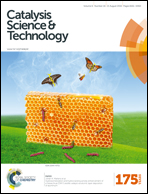On the performance of a Co-based catalyst supported on modified γ-Al2O3 during Fischer–Tropsch synthesis in the presence of co-fed water
Abstract
The effect of water on the Fischer–Tropsch performance of a supported cobalt catalyst has been studied in a fixed bed reactor by running co-feeding experiments for more than 1000 h under industrially relevant process conditions. The adopted γ-Al2O3 support (Dp = 300 μm) has been modified with superficial cobalt aluminates to reduce the risk of formation of these species during the reaction as a consequence of the strong interaction between the active phase and the support. In spite of this precaution, the addition of water results in the slow deactivation of the catalyst, possibly caused by the oxidation of the reduced cobalt metal centers. The effect of water on the product distribution is more complex: in this case, water has both irreversible effects, which become stronger upon increasing the concentration of co-fed water, and reversible effects, which are clearly visible even with small concentrations of co-fed water. The two effects lead, in the presence of co-fed water, to decreased CH4 and alcohol selectivities and increased C25+ hydrocarbon, olefin and CO2 selectivities. These results can be explained by assuming that water suppresses hydrogenation reactions.


 Please wait while we load your content...
Please wait while we load your content...